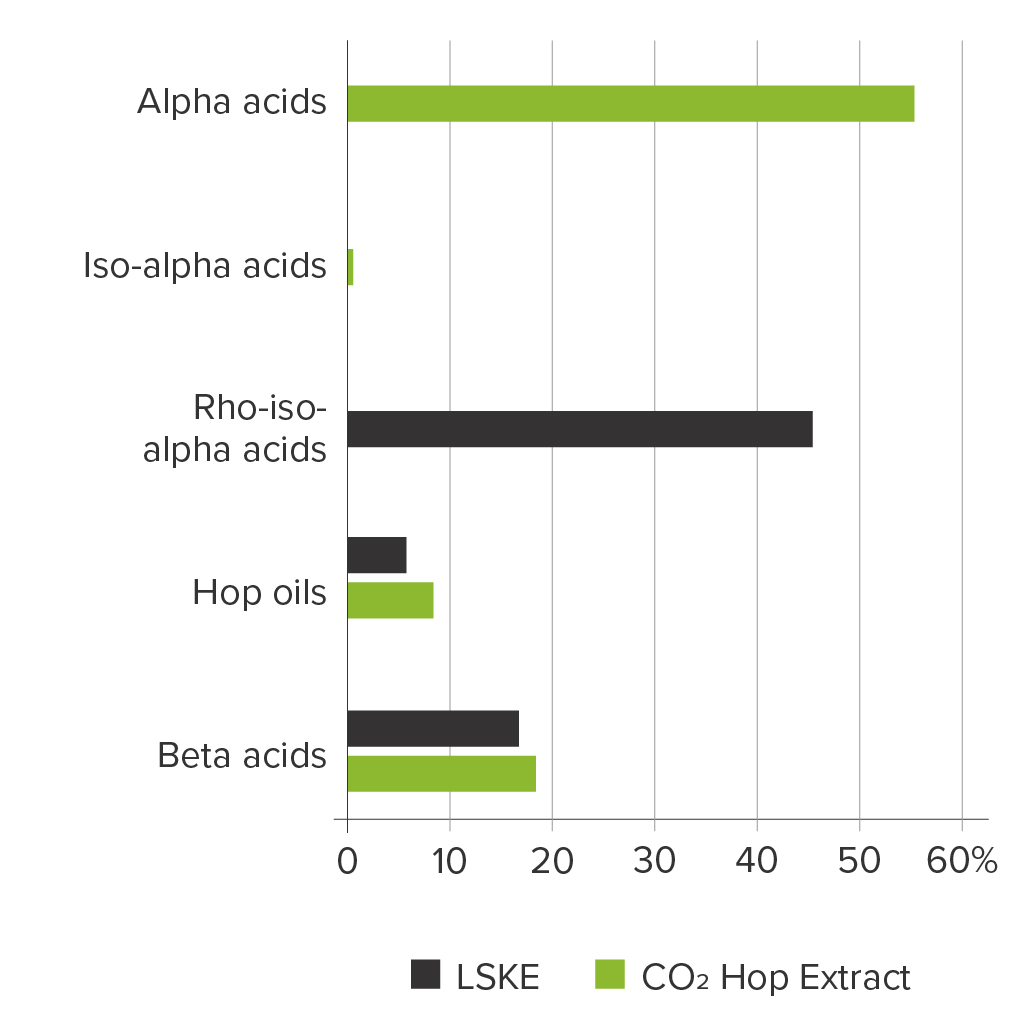
Light Stable Kettle Extract
Overview
Light Stable Kettle Extract (LSKE) is produced from CO2 hop extract and can be used like a regular kettle extract.
LSKE contains reduced (rho) isomerized alpha acids (in their potassium salt form), beta acids and hop essential oils.
LSKE provides substantial protection against lightstruck flavor when used as the sole source for bitterness.
LSKE is the only light stable hop product which can be added during wort boiling, contributing to both, bitterness and hop aroma.

Specifications
- Short description
- light stable hop extract for bitterness and hop flavor during wort boiling
- Alpha acids
- below detection limit
- Iso-alpha acids
- below detection limit
- Beta acids
- 5 - 30 %
- Rho iso-alpha acids
- 35 - 45 %
- Hop oils
- 3 - 10 %
- pH
- 7.5 - 8.0 (in water)
- Density
- 1.05 - 1.10 g/ml (20 °C / 68 °F)
- Viscosity
- 200 - 600 mPas (50 °C / 122 °F)
Properties
Appearance
Reddish or yellow-green in color, LSKE is a thick syrup-like extract.
Flavor
Unlike other rho iso-products added post-fermentation, the flavor characteristics of LSKE are similar to those of regular CO2 hop extract. The additional presence of both beta acids and hop oils in this extract imparts a more rounded and fuller flavor to beer. Compared to iso-alpha acid products, reduced iso-alpha acids (rho) lend a smoother, non-lingering bitterness to beer. Depending on the total bitterness and type of beer, the intensity of the bitterness of rho iso-alpha acids is 60 to 70 % of that achieved with iso-alpha acids. Thus, the sensory factor of rho iso-alpha acids is 0.6 - 0.7 times the bitterness of iso-alpha acids at a value of 1.0.
If added at the end of the boil, LSKE imparts a typical late hop aroma to the beer.
Utilization
Based on HPLC analysis of the finished beer, utilization of rho iso-alpha acids within a range of 45 - 55 % can be expected. Utilization is likely to be at least 50 % higher than that achieved with regular CO2 hop extract. Late kettle additions of LSKE greatly enhance hop oil retention. Actual utilization will vary from brewery to brewery due to differences in equipment and process conditions.
Light Stability
LSKE only provides protection against lightstruck flavor in the complete absence of alpha acids and iso-alpha acids. LSKE can be used in conjunction with any Hopsteiner® light stable product to achieve light stability.
Quality
All Hopsteiner® products are processed in facilities which fulfill internationally recognized quality standards.
Packaging
Our products are delivered in their respective recommended standard packaging. Alternatives may be possible upon customer request.
Standard packages of our processing plants in the USA (US) and Germany (DE) are:
- Cans 0.5 - 4.0 kg (US)
- Cans 0.5 - 3.1 kg (DE)
- Pail 4 - 20 kg (US)
- Drum 200 kg (US / DE)
Usage
LSKE is typically added to the wort kettle as a complete or partial replacement for any other light stable hop product. Furthermore the dosage of LSKE during wort boiling reduces the risk of bacterial infection.
For Light Stable Beer
For maximum protection against lightstruck flavor, it is essential that no other sources of non-reduced iso-alpha acids are inadvertently introduced into the wort or beer. Therefore, the following must be carefully implemented:
- exclusive use of light stable hop products throughout the entire process.
- avoid contamination through equipment surfaces previously in contact with regular iso-alpha acids.
- never pitch wort with yeast that has been in contact with regular alpha and iso-alpha acids.
Dosage
Kettle additions of LSKE are based on the concentration of rho iso-alpha acids, sensory factor of rho iso-alpha acids and the desired intensity of bitterness in the beer.
Application
LSKE can be added in similar ways to regular kettle hop extracts. LSKE can be added to the kettle when the transfer of lauter wort to the kettle commences, at the beginning of the boil or up to five minutes before casting out the wort. Pre-warming cans of LSKE is not necessary. Suspending punctured cans in the boiling wort will ensure that all of the extract is completely flushed out into the kettle.
If LSKE is added by means of automatic dosing units, it should be warmed to 50 - 60 °C (122 - 140 °F) and gently mixed to ensure perfect dosing.
Storage
The recommended storage temperature in the original unopened packaging is < 10 °C (50 °F).
Short-term, transport-related temperature deviations do not affect product quality.
Best Before Date
Under the recommended storage conditions, the shelf life from the date of production/ packaging is at least 6 years.
Safety
Ensure good ventilation of the workplace and wear personal protective equipment. Avoid contact with eyes and skin. Do not inhale vapors or dusts. For full safety information, please refer to the relevant Hopsteiner® safety data sheet.
Analytical Methods
International approved methods listed in commitees such as ASBC or Analytica-EBC using current standards are applied.
Product analytics
- Analytica-EBC 7.8 (HPLC)
- Analytica-EBC 7.9 (HPLC)
- Analytica-EBC 7.10 (Distillation)
- ASBC Hops-13 (Distillation)
Beer analytics
- Analytica-EBC 9.47 (HPLC)
The standard formula for calculating bitter units in beer (Analytica-EBC 9.8 or ASBC Beer-23A) may need to be adjusted as it results in too low values when using higher amounts of LSKE.
Technical Support
We are pleased to offer assistance and advice on:
- safety data sheets
- support for brewing trials on a pilot or commercial scale
- analytical services and information about analytical procedures
Disclaimer: The information provided in this document is believed to be correct and valid. However, Hopsteiner® does not guarantee that the information provided here is complete or accurate and thus assumes no liability for any consequences resulting from its application.
Last updated: 10/06/2024
Save PDF